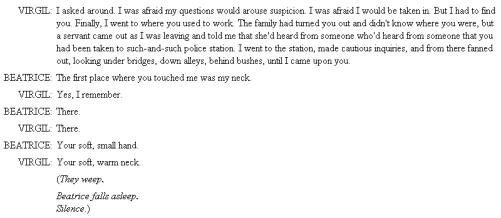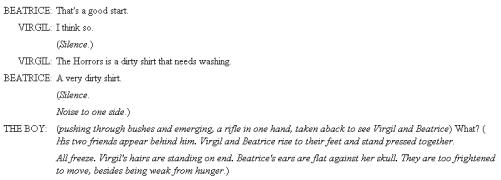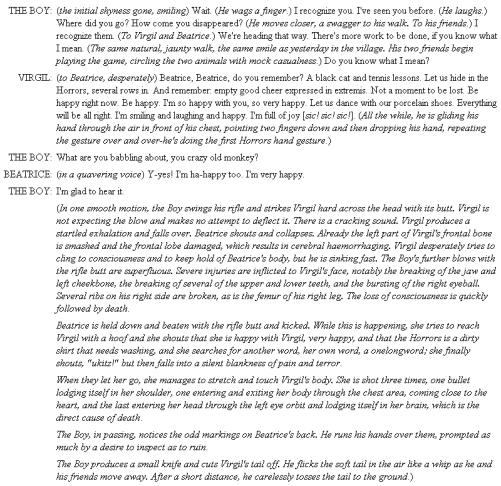They insulted me repeatedly, though I wouldn't say they were actually angry or worked up. They were just doing their job. When they got tired, they worked in silence.
It ended in the late afternoon, around five o'clock, I suppose, after a day's work was done. Home beckoned. They unstrapped me from the harness and threw me into a small cell. After two days and nights of solitary confinement, pain-ridden and foodless, I was released. They opened my cell door, stood me up, marched me out, and left me at the outside gate. Not a word was said. I didn't know where you were and you didn't know where I was. I limped away until I reached the riverbank, where I collapsed in a secluded spot and where you eventually found me.

The silence in the play continued out of it. The taxidermist didn't say anything more and Henry was speechless. It wasn't just the elaborate, institutional torturing of a donkey. It was something else that arrested him, a detail about the head torturer. Beatrice described him as "a tall, raw-boned man". The second adjective was unusual enough that for a moment Henry misunderstood it; a literal and gruesome image flitted through his mind. Then he remembered its proper meaning: lean, gaunt, an absence of fleshiness. Henry dwelt on the image. A tall, raw-boned man. He glanced at the taxidermist. Perhaps it was a coincidence.
"Well, that was disturbing," Henry finally said.
The taxidermist did not reply.
"Among the characters in the play, you mention a boy and his two friends. When do they appear?" Henry asked.
"At the very end of the play."
"There's this sudden intrusion of human characters in your animal allegory."
"That's right." The taxidermist said nothing more, only looked out blankly.
"What happens with the boy?"
The taxidermist picked up some papers.
"Virgil has just finished reading out the sewing kit as they have it so far. You remember the sewing kit?"
"I do."
He read:

"They recognize the boy," the taxidermist interrupted. "The day before, in the village where they were staying, this boy had been one of the main instigators in some terrible deeds."
"Go on," Henry said.
The taxidermist read:

The taxidermist fell silent. "And that's how the play ends?" Henry said. "That's how the play ends. After that, the curtain comes down."
The taxidermist got up and walked to one of the counters. After a moment Henry followed him. The taxidermist was looking at some pages he'd neatly spread out.
"What's this?" Henry asked.
"A scene I'm working on."
"What's it about?"
"Gustav."
"Who's Gustav?"
"He's a dead, naked body that's been lying near Virgil and Beatrice's tree the whole time."
"A human body? Another human?"
"Yes."
"Lying in the open?"
"No, in some bushes. Virgil discovers him."
"They don't smell his body before that?"
"Sometimes life stinks just as much as death. They don't."
"How do they know he's called Gustav?"
"They don't. Virgil calls him that to give him a name."
"Why is he naked?"
"They figure he was told to strip and was then shot. They think the red cloth was probably his. He might have been a peddler."
"Why do they stay? After finding a dead body, wouldn't the more natural reaction be to run away?"
"They think of it as a place already plundered and now safe."
"What do they do about Gustav? Do they bury him?"
"No, they play games."
"Games?"
"Yes. It's another way they find of talking about the Horrors. It's in the sewing kit."
That's right, Henry remembered: games for Gustav.
"Isn't that an odd thing to do, to play games when there's a dead body right next to you?" Henry said.
"They imagine that Gustav would enjoy them if he were still alive. Playing games is a way of celebrating life."
"What kind of games?"
"That was my question for you. I thought you might come up with a few. You seem like the playful sort."
"What, like hide-and-seek?"
"I was hoping for something more sophisticated."
"You mentioned some terrible deeds instigated by the boy who kills Beatrice and Virgil."
"Yes."
"Beatrice and Virgil saw these deeds?"
"Yes."
"What did they see?"
The taxidermist said nothing. Henry was about to repeat his question but he thought better of it. He waited. After a long while, the taxidermist spoke.
"At first they didn't see. They heard. They were standing by the village pond among some bushes, sipping at the water's edge, when they heard screams. They looked up and saw two young women wearing long skirts and heavy peasant boots running for the pond, clutching bundles to their chests. Some men were behind them, not in hot pursuit but rather seeming to enjoy the women's flight. Terror and the grimmest determination were written on the women's faces. First one reached the pond, then the other. Both ran into it without a pause. When they were thigh-deep in the water, they dropped what they were carrying.
"It was then that Virgil and Beatrice saw that their bundles were swaddled babies. The women pushed their babies underwater and held them there. Even after the few bubbles stopped popping at the surface, there was no hesitation on their part, no flexing of the arms. On the contrary, the women continued to move deeper into the pond, kicking at their skirts and losing and regaining their footing. The men lining the edge of the pond-there must have been ten or so-far from offering any kind of help, jeered the women on.
"When she was certain that her baby could no longer be alive, yet still clutching it beneath the surface, one of the women, now past her waist in the black water, plunged headfirst and immediately was drowned. Neither she nor her baby broke the surface again. They both sank to the bottom. The other woman tried to do the same but could not manage it, even when it was obvious that her baby, like the other, was dead. She kept coming up for air, coughing and snorting, which provoked laughter among the men, who shouted advice on how best to drown. Whereas the first woman's death had proceeded with the swiftness of gravity, the second woman's took longer. For minutes she stood in the water, shivering and staring at its surface and looking at the men on the shore and attempting again to drown herself, all done without any show or any effort to communicate, only with the grave look of someone trying to kill herself. Her baby was gone and she was determined to follow it close behind. Finally, with a glance up to the sky, lifting the soggy mass of her baby out of the water and pressing it to her chest, the woman forcefully threw herself forward and managed to end her days. A hand clawing at the surface of the water, a muddied boot kicking up awkwardly, a bubble of skirt briefly floating-then she was gone. Ripples faded and the pond was still once more. The men cheered and moved on."
"And Beatrice and Virgil in all this?" Henry asked quietly.
"They neither moved nor made a sound the whole time and they remained unnoticed. As soon as the men dispersed, they fled the village. Images kept pressing upon them. Beatrice could see the face of one of the babies, the first one to be drowned, a fleeting, expressive pinkness, with a small escaped hand reaching up to its mother. Another face harried Virgil: that of a boy-he could not have been more than sixteen or seventeen years old. In his pursuit of the women, he slowed and kicked the ground in their direction, throwing up a cloud of dirt and pebbles, his kicking leg raised high in the air as he hopped on the other to a stop-this done with the easy, elastic vigour of youth, accompanied by a whoop and a holler. Then he started running after the women again. He was one of the loudest and most excited at the pond's edge."